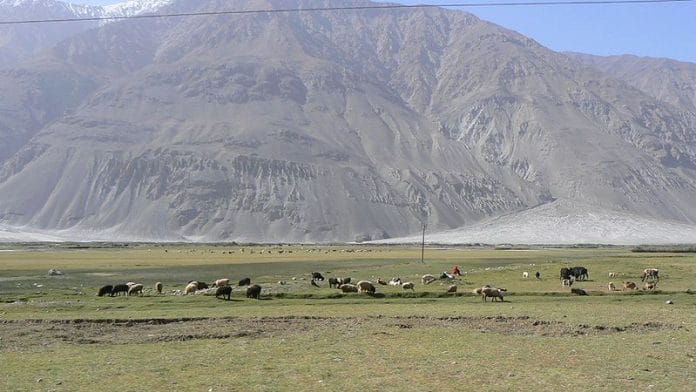Thank you dear subscribers, we are overwhelmed with your response.
Your Turn is a unique section from ThePrint featuring points of view from its subscribers. If you are a subscriber, have a point of view, please send it to us. If not, do subscribe here: https://theprint.in/subscribe/
Pakistan-Occupied Kashmir (POK), comprising Azad Jammu and Kashmir (AJK) and Gilgit-Baltistan, has long been a contested region, marked by its strategic importance and the enduring conflict over Kashmir between India and Pakistan. Unfortunately, the region has become synonymous with systemic human rights violations, denial of political freedoms, and suppression of dissent.
Human rights abuses in POK include enforced disappearances, extrajudicial killings, arbitrary detentions, and crackdowns on political activists. Reports from human rights organizations and local witnesses highlight a systematic pattern of abuse.
POK is heavily militarized, with significant control exerted by the Pakistani military and intelligence agencies. Civilians, particularly activists and journalists, face intimidation, harassment, and detention without due process.
Enforced disappearances have been widely reported, with victims often subjected to torture in detention centres. Families of the disappeared face immense challenges in seeking justice due to a lack of accountability mechanisms.
The Pakistani government imposes strict censorship in POK, restricting freedom of the press and expression. Journalists and activists critical of the administration face threats, arrests, and even physical violence. In 2020, Tanveer Ahmed, a journalist from AJK, was arrested for raising the Pakistani flag’s removal during a protest demanding genuine autonomy for the region.
Despite being referred to as “Azad” (free), POK does not enjoy genuine autonomy. The political framework and governance of the region remain tightly controlled by Islamabad. The Jammu Kashmir Liberation Front (JKLF) has faced repeated bans, and its leaders have been targeted for their political activities.
The 1974 Interim Constitution of Azad Jammu and Kashmir effectively subordinates the region to Pakistan’s control. The Azad Jammu and Kashmir Council, dominated by members appointed by the Pakistani government, overrides the authority of locally elected representatives. Under this constitution, AJK’s government cannot make independent decisions without approval from the Pakistani government. The AJK Council, dominated by members from Islamabad, controls significant legislative and financial matters. In 2018, AJK’s local representatives openly criticized the Council’s interference, calling it a barrier to genuine self-governance.
Shia Muslims in Gilgit-Baltistan face systemic discrimination and sectarian violence. There have been instances of targeted killings, forced demographic changes, and state-sponsored marginalization.
Gilgit-Baltistan is neither formally integrated into Pakistan nor given autonomy, rendering its residents politically disenfranchised. The region’s lack of representation in Pakistan’s National Assembly further deepens the denial of basic political rights. The case of Baba Jan, a political activist from Gilgit-Baltistan, was jailed for organizing protests against the government’s inadequate response to a natural disaster in 2010. His detention and alleged torture exemplify the suppression of dissent. In 2018, peaceful protests in Gilgit-Baltistan against land grabs by the military were met with violent crackdowns, leading to arrests and injuries.
In 2020, protests erupted when Pakistan announced plans to grant provisional provincial status to Gilgit-Baltistan, as locals feared it would cement Islamabad’s control without addressing their demands for genuine rights and autonomy.
Political parties and activists advocating for greater autonomy or independence are frequently targeted. Groups calling for self-determination face bans, and their members are arrested or silenced.
Elections in POK are often marred by allegations of rigging and manipulation by the Pakistani state. Candidates are required to pledge allegiance to Pakistan, marginalizing pro-independence or pro-Kashmir unity voices. During the 2021 AJK elections, opposition parties and activists accused Pakistan of manipulating results to favor the ruling party in Islamabad.
The human rights and political crisis in POK have profound effects on its residents. Restricted access to justice, underdeveloped infrastructure, and poverty exacerbates the hardships faced by the population. The suppression of dissent and lack of accountability create a climate of fear, hindering socio-economic development and the realization of fundamental freedoms.
Amnesty International and HRW have repeatedly raised concerns about the arbitrary detention and suppression of activists and journalists in POK.
In 2019, Amnesty International highlighted the lack of press freedom in POK, citing numerous cases where journalists were harassed or jailed.
In 2021, the European Parliament discussed the human rights situation in POK, citing evidence of enforced disappearances, sectarian violence, and lack of political representation. The report highlighted human rights abuses in both Indian-administered and Pakistan-administered Kashmir and pointed out the systemic denial of fundamental rights in POK, including the lack of independent judiciary and political freedoms
The international community has largely overlooked the plight of POK’s residents, focusing instead on broader geopolitical disputes. Advocacy for their rights requires greater attention from global human rights organizations and intervention by international bodies.
The human rights violations and denial of political rights in Pakistan-Occupied Kashmir underscore the urgent need for reform and accountability. Empowering the local population through genuine autonomy, political representation, and safeguarding their fundamental freedoms is essential. The international community must recognize the severity of the situation and advocate for the rights and dignity of the people of POK.
These pieces are being published as they have been received – they have not been edited/fact-checked by ThePrint


